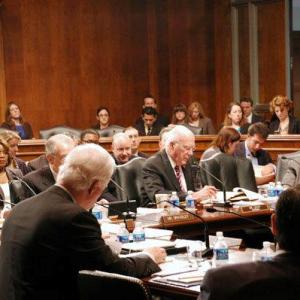
The committee also gave bipartisan approval to a bill authorizing an increase of $10 million, from $30 million to $40 million, in annual federal grants for public schools to enhance security measures such as installing reinforced doors, locks, lights and fencing.
The committee’s actions mark legislative progress on safety measures in response to the elementary school shootings in Newtown, Conn., last December, which prompted a national debate on school security and gun violence. The Obama administration has made the expansion of background checks for all gun sales a key part of its blueprint for reducing gun violence in communities.
Currently, buyers of guns from private sellers and gun shows are exempt from undergoing background checks. Congressional Republicans have voiced firm opposition to changing that.
At the committee discussion on S. 374, The Protecting Responsible Gun Sellers Act of 2013, ranking minority member Sen. Chuck Grassley (R-Iowa) said he was particularly troubled by the bill’s requirement that gun owners who lose a firearm must report its loss within 24 hours. That posed a threat to freedom, he said, and criminalized inaction rather than a particular action.
He also questioned the usefulness of expanding background checks for private gun sales. Criminals would increasingly rely on other people to purchase guns for them, a tactic known as “straw purchasing,” making such a law ineffective, Sen. Grassley said.
Sen. Charles Schumer (D-N.Y.) who sponsored the bill, pushed back. Why have laws against murder or terrorism or money laundering, he asked Grassley, if there were always going to be people who break them?
“You never see the argument ‘You shouldn’t have laws because the bad people will get around them anyway,’” Schumer said. “It makes no sense in my judgment.”
Background checks were not a hidden path to a national registration database of gun owners, as some opponents were hinting, Schumer said. Referring to the 1993 law requiring background checks of people purchasing firearms from federally-licensed dealers, Schumer said, “All we’re doing now is extending the Brady law to the areas that it doesn’t cover,” he said. “This idea that this will lead to national registration and confiscation, I have to tell you, my friend Chuck Grassley, that demeans the argument.”
Opponents should use rational arguments against the bill, he said. “Right after Newtown, there was a view that maybe the right place that we could all come together on was background checks, because background checks do not interfere with law-abiding citizens right to bear arms,” Schumer said. “They simply say that someone who’s a felon, who’s an abuser, shouldn’t get a gun.”
Ultimately, the committee approved the bill along strict party lines, 10 votes to 8.
The committee also approved the School Safety Enhancements Act, S. 146, which expands to $40 million the annual federal funds available to public schools that want to beef up security measures. That bill passed with bipartisan support of 14 votes to four.
Schools or their communities would apply to receive funds for enhancing their security through the U.S. Justice Department’s existing Secure Our Schools program, which matches local funds for security projects according to a 50-50 ratio. The Save our Schools program was authorized in 2000, in response to the shootings at Columbine High School in Colorado in April 1999.
As introduced by Sen. Barbara Boxer (D-Calif.) last December, the School Safety Enhancement Act increased Save Our Schools funding from $30 million to $100 million, but that number was revised downward to $40 million in committee. This new amount would essentially account for inflation in the last 13 years, Sen. Grassley pointed out.
The School Safety Enhancement Act would also create a joint task force between the Department of Justice and the Department of Education that would develop advisory guidelines on safety for schools serving kindergarten through 12th grade. The bill would also establish a National Center for Campus Public Safety as a resource for universities and colleges.
The National Education Association, a labor union representing 3 million public school educators and workers, released an open letter of support for the legislation. The letter applauded the bill’s provisions allowing schools to customize security measures to their needs, and requiring schools to consult with multiple stakeholders, including parents, teachers and local law enforcement, when drawing up security plans.
“Safe and orderly schools facilitate effective teaching and learning, while violence or the threat thereof diverts attention and resources away from education,” the NEA letter said. “Students cannot learn and educators cannot teach when threatened by physical violence or harassment.”
If the full Senate approves the bills, they must still make it past the Republican majority in the House of Representatives and be signed by the president into law.
Photo courtesy of Senator Patrick Leahy
























